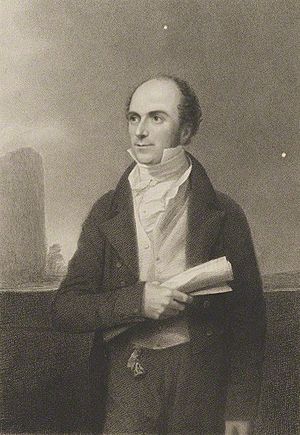Charles Phillips (barrister) facts for kids
Charles Phillips (around 1787–1859) was a famous Irish barrister (a type of lawyer who speaks in court) and a writer. He was known for his powerful speeches and his strong opinions.
Contents
Life of Charles Phillips
Charles Phillips was born in Sligo, Ireland, around 1787. His father, William Phillips, was a town councillor. Charles went to Trinity College Dublin when he was 15, graduating in 1806.
After college, he moved to London and began studying law. In 1812, he became a barrister in Ireland. He quickly became known for his very dramatic and emotional speaking style in court. While some other lawyers didn't like it, juries often found his speeches very convincing.
Fighting for Rights
Even though Phillips was Protestant, he strongly supported a movement called Catholic Emancipation. This movement aimed to give Catholics in Ireland more rights and freedoms. In 1813, he was publicly thanked by the Catholic Board for his efforts. A famous Irish leader, Daniel O'Connell, praised Phillips highly.
Career in England
In 1821, Phillips was invited to work as a barrister in England. He quickly became a top lawyer at the Old Bailey, a famous court in London. He was offered important legal jobs, but he turned them down. Later, in 1842, he became a judge for bankruptcy cases in Liverpool. In 1846, he got another important job as a judge for people who couldn't pay their debts in London.
Charles Phillips passed away in London on February 1, 1859, at the age of 70. He was buried in Highgate Cemetery.
Phillips's Reputation
Charles Phillips was known for his very passionate and sometimes over-the-top speeches. Some people, like Lord Brougham, admired his speaking, calling it "horticultural" because it was so flowery. Others, like Sir James Mackintosh, thought his style was "pitiful" and too much.
Controversy in Court
Phillips faced some criticism for how he handled a famous court case in 1840. He defended a man named Courvoisier, who was accused of a serious crime. During the trial, Courvoisier admitted to Phillips that he was guilty. Despite this, Phillips continued to argue that his client was innocent. This caused a lot of debate about what a lawyer should do when they know their client is guilty. Many people felt this damaged Phillips's reputation.
His Writings
Phillips was also a writer. He wrote a book called Curran and his Contemporaries (1818), which showed off his writing skills. He also wrote a strong piece criticizing the French Emperor Napoleon Bonaparte, which was published when Napoleon's power ended. Phillips also wrote an essay about capital punishment (the death penalty) that was supported by the Quakers, a religious group known for their peaceful beliefs.
 | John T. Biggers |
 | Thomas Blackshear |
 | Mark Bradford |
 | Beverly Buchanan |


